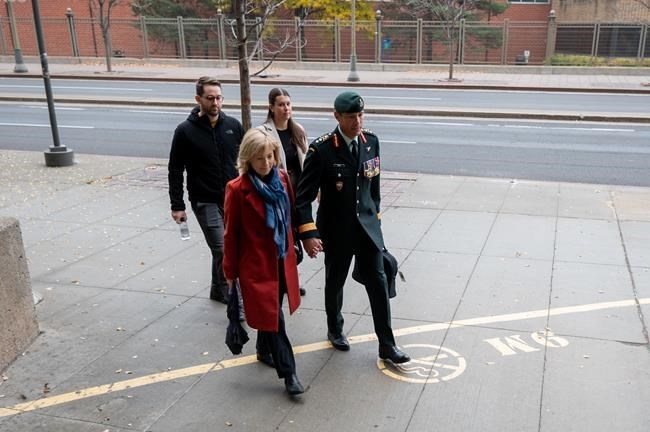
Maj.-Gen. Dany Fortin, right, arrives with his wife Madeleine Collin at a Gatineau, Que. courthouse on Tuesday, Oct. 25, 2022. THE CANADIAN PRESS/Spencer Colby
Republished November 17, 2022 - 6:56 PM
Original Publication Date November 17, 2022 - 10:46 AM
OTTAWA - The Canadian Armed Forces is cracking down on the wearing of uniforms and medals in civilian courts, saying such attire will be banned from non-military trials except in certain circumstances.
The move announced by vice-chief of the defence staff Lt.-Gen. Frances Allen follows outrage over Maj.-Gen. Dany Fortin’s decision to wear his uniform and medals during his sexual assault trial in civilian court.
Defence Department spokesman Daniel Le Bouthillier did not specifically cite Fortin, who has maintained his innocence and is currently awaiting a judge’s verdict, when asked about Allen’s reasons for ordering an end to such displays.
However, he acknowledged in a statement that the military decided to review its existing policy “following concerns expressed to us in September by those with lived experiences of trauma, as well as questions from media.”
Fortin, who previously served as head of the federal government’s COVID-19 vaccination rollout campaign, first appeared in uniform in civilian court in September and again in October.
Taking effect on Dec. 1, Allen’s order bans Armed Forces members from wearing a uniform during civilian court proceedings unless they are testifying on behalf of the military or the Crown in a military capacity. That includes military lawyers and police.
The order, which follows promises over the last year to start transferring cases involving criminal sexual behaviour from the military justice system to civilian courts, also forbids the wearing of medals during any appearance in civilian court.
Military personnel can apply for an exception by making a formal request to their chain of command, which will be decided based on several factors such as the nature of the proceeding and the role of the Armed Forces member.
Reached by email on Thursday, Fortin said he would not be making any comments until the judge renders his decision in his sexual assault case.
Allen's order was greeted with applause from Lori Buchart, who previously served as co-chair of It’s Not Just 20K, a support and advocacy group created by victims of military sexual misconduct.
Buchart had previously expressed concern that wearing uniforms and medals in civilian courts could create bias during trials, particularly those involving juries, and intimidate victims of military sexual misconduct.
“The decision to ban uniforms except in cases of duty is the absolute right decision,” said Buchart on Thursday.
“We are extremely pleased there is clarity on this issue going forward from a policy stance. … We are appreciative the CAF took the concerns of those affected seriously, understanding the harm and retraumatization that can occur in situations such as this.”
Charlotte Duval-Lantoine, an expert on military sexual misconduct at the Canadian Global Affairs Institute, suggested the new order could "level the playing field" when it comes to court proceedings.
"As we have seen in many cases, some may see military service as a reflection of an individual’s character and as a means to fend off the accusations," she said.
"Lawyers can still make the case without the powerful image that can subconsciously influence a jury and a judge, as well as unnecessarily harm the accuser."
Yet Duval-Lantoine also expressed some hesitation about the ability to apply for an exception, and how such decisions will be made.
Retired lieutenant-colonel Rory Fowler, who is now a lawyer specializing in military cases, questioned whether Allen actually has the authority to dictate when and where Armed Forces members can wear their medals.
“If (Allen) is suggesting that the wearing of medals in civilian attire is prohibited, then she may well be overstepping the limits of her authority,” Fowler said in an email.
“When worn with Canadian Forces dress, the medals form part of that CF dress. The chief of defence staff can issue direction regarding how the medals may be worn with uniforms. But medals do not have to be worn with CF dress.”
Fowler also noted that while Allen’s order was broadcast to troops via what is called a Canadian Forces General Message, or Canforgen, the military’s actual dress regulations and other legal directives remain unchanged.
“The CF keeps using Canforgen as policy instruments,” he said. “They are not meant to be policy instruments. As I have mentioned previously, Canforgens represent a messaging system. … Why haven’t (the directives) been amended?”
This report by The Canadian Press was first published Nov. 17, 2022.
Note to readers: This is a corrected story. A previous version said Rodney Sellar is the lawyer representing Maj.-Gen. Dany Fortin.
News from © The Canadian Press, 2022